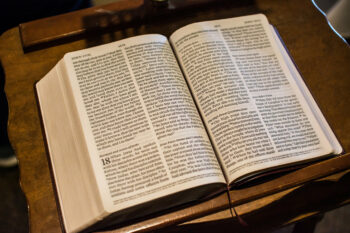‘The Word was made Flesh and Dwelt Amongst Us’

by Sue Jones
Part 1 of 4
I was at a place recently where the Angelus was prayed daily. It took me back to my childhood education with the nuns and the habitual, holy nature of prayer which they instilled in me. Habits in a Catholic life are a comfort and can be of immense benefit to the domestic life of the Church. From time to time our habits need refreshing. We sense this need through the Holy Spirit niggling away at our conscience and in the spiritual leadership of the Church. Vatican II warned us of a change of era and the need for spiritual renewal.
A prayer habit raises our awareness of God in heaven and adds a sacred dimension to our everyday existence. As we grow in prayer, we begin to speak of a ‘prayer life’. The more we desire to know the unknowable God, the more God will help us to be holy. Prayer then becomes integral to our lives. We no longer speak of a ‘prayer life’ as something that belongs to us alone or as something separate from our social lives lived as Catholics in the world.
Prayer brightens the life of the Church. It does so because it changes a person’s love for the better. Love bettered by prayer makes the Church a happier place to be. It also gives a person a Samaritan advantage when it comes to evangelising ad hoc in the world. The Catholic Church, whose traditions are by nature conservative, needs persons whose love is always being liberated by prayer. When we change our love to be more like God’s love we begin to see his Son as a person who loved without fail, and begin to enter that great story of God revealing himself to his people.
 Changes of era are a gift to the Church. They are difficult times to live through but in them we have an opportunity to review personal and public habits of prayer in the interests of Catholic tradition.
Changes of era are a gift to the Church. They are difficult times to live through but in them we have an opportunity to review personal and public habits of prayer in the interests of Catholic tradition.
Vatican II has heightened awareness of the Word in our sacramental lives and put before the laity the possibility of the practice of Lectio Divina. This is the practice of praying with scripture, beginning especially with reading, reflecting and meditating on the Gospels. Many persons are already ‘doing’ Lectio Divina and persevering with it.
In my early adult life, (the early days after Vatican II,) I often heard people of other faiths say that “Catholics don’t have the Bible.” That was not strictly true but after Vatican II scripture became a richer experience for laity, both through variety in liturgy and as a focus for private, prayerful reflection. These changes were, and still are, an opportunity to breathe new life into old habits of prayer.
Bringing the Word to life in our old ways of habitual, repetitive prayer can be difficult. Lectio Divina could challenge our current attitudes towards God and upset old patterns of behaviour. A daily relationship with the Word, like any relationship between persons, needs work.
As we take up this call to a more self-reflective sort of prayer we become part of a communion of persons who are establishing a new lay tradition in prayer. It must be said that the purpose of the habit of praying Lectio Divina is not to be able to quote the Bible at others. As a goal, that would struggle to be part of a lay Catholic tradition. All we really want to do is to bring about changes in our love of each other, our love of God and of course the hardest love of all, that of loving the stranger as much as we love ourselves.
The fruits of the Holy Spirit in our prayerful habit will be noticeable and bear fruit which lasts. The bountiful nature of these fruits being brought into being and lived by many Catholics can hardly be measured by today’s secular standards of success. It can be said however that things get better in all relationships, people get on better.
As fresh, verdant shoots of love spring up, division melts, the conservative breaks bread with the liberal, a husband and wife soften their sharp words and share a glass of finely strained juicy wine, the Church flourishes and individuals get a clearer, personal idea of their evangelising mission in God’s plan for the world.
 Entries(RSS)
Entries(RSS)